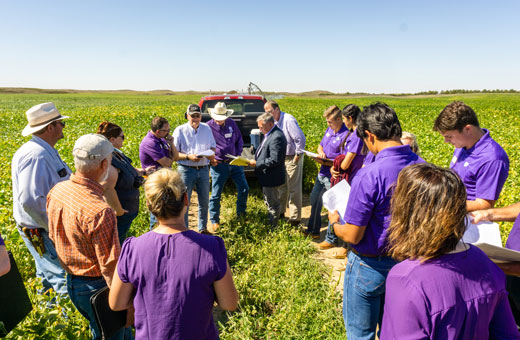November 28, 2022
Community visit spotlight: Farmers in Rattlesnake Creek watershed use water conservation methods
 |
President Richard Linton along with other K-State faculty, staff and students visit with farmers in the Rattlesnake Creek watershed. |
Water is a vital resource in all systems economically, socially and environmentally. Of the many ways in which water impacts people, its intersection with agriculture is perhaps the most prevalent. Farmers and ranchers know that conservation of water can determine the destiny and future of farming.
Water users from Barton, Edwards, Kiowa, Pawnee, Pratt and Stafford counties wanted a unified voice on water issues and formed the Water Protection Association of Central Kansas, or WaterPACK, a grassroots organization. Their commitment is to the beneficial, economical and sustainable use of quality water.
During the Ford County regional community visit, Richard Linton, K-State president, and Susan Metzger, associate director for agriculture and extension, along with other K-State faculty, staff and students, visited with Richard Wenstrom and Pat Janssen, farmers in the Rattlesnake Creek watershed, to learn about water management practices utilizing K-State water management resources to conserve water. Metzger, who is also director of the Kansas Center for Agricultural Resources and the Environment and the Kansas Water Resources Institute, spoke about the significance of this visit.
"Water is critical to the livelihood of western Kansas and the lifeblood of the state's largest economic driver: agriculture," Metzger said. "For that reason, highlighting Kansans who are balancing the regional demands for water and finding innovative ways to reduce their own water use seemed like an important topic for the president to include on the Ford County regional community visit."
WaterPACK established one of the first water tech farms in the state to evaluate the increased efficiency, and practical use of Mobile Drip Irrigation to apply through center pivots. K-State scientists became deeply involved in establishing and monitoring the farms to help answer producers' specific questions and concerns about the new technology.
KANSched and the Mesonet network of weathers stations, established by Kansas State University, are two critical resources utilized by farmers to assess irrigation efficiency on their farms. KanSched is a computer software program that is designed to help monitor the root zone soil profile water balance and schedule irrigation events on a field using evapotranspiration data. The term evapotranspiration combines evaporation from soil surfaces with transpiration from plants to describe the total amount of water lost from a crop. The basic process involves using data on crop water use — crop evapotranspiration — rainfall and soil water storage to assess when an irrigation event is needed and how much water could be applied. KanSched was developed to be user friendly with minimal training requirements and operational inputs. These tools along with the assistance of K-State irrigation engineer Jonathan Aguilar allow farmers to use their best judgment when it comes to irrigation practices and water conservation on their farms.
Key issues and points highlighted during the visit included unique groundwater challenges of the region and the tools and resources local producers need from K-State. For example, Rattlesnake Creek watershed farmers noted their use of several K-State tools for irrigation scheduling and management. K-State is currently working to convert KanSched for use on a mobile device but Wenstrom and Janssen have encountered challenges. With the feedback from the site visit, K-State is working to improve calculations in the irrigation scheduling tools and find a partner who can provide consistent technical support. Conversations have begun with on-campus climatologists and computer science faculty to improve evapotranspiration data collection to advance the work of WaterPACK and K-State scientists. Data improvements from these projects play a large part in the design and implementation of future water conservation practices within the state of Kansas and beyond.
Explore K-State's regional community visits and engagement partnerships through our StoryMap. As K-State faculty, staff and/or student, are you interested or currently immersed in university-community engagement work? Contact the Office of Engagement for opportunities to begin or grow your scholarly research.
